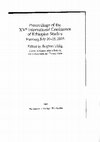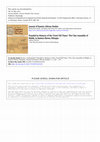Website Andrea Nicolas: by Andrea Nicolas
Books by Andrea Nicolas

Abstract:
Life-course paradigms belong to the most salient features in social life. Virtually ... more Abstract:
Life-course paradigms belong to the most salient features in social life. Virtually everyone is affected by one or the other version of their formulations. Accordingly important it seems to detect their underlying bases and assumptions and to show the deep impact these visions have on our lives. The present volume collects a number of articles coming from very varied backgrounds, such as sociology, psychology, anthropology and gerontology. The papers were originally presented at the international, inter-disciplinary conference “Times of our lives: Growing up and Growing old,” at the University of Oxford, in Summer 2009. They all share a common interest in the topic of ageing and in the different ways that life-courses may be shaped in different historical and cultural contexts. The authors in this volume engage in a fruitful mutual exchange, and they do so from different angles and perspectives. The interdisciplinary approach in this book provides a most promising arena for the discussion of ageing.
Table of Contents:
Introduction (Andrea Nicolas and Ian Flaherty), pp. vii-xv
Part 1: Trajectories in Time: Chronology, Age and Visions of the Life-Course
‘Teen Brain’ Stories and Their Place in Contemporary Discourses of (Im)Maturity across the Lifespan (Monica A. Payne), pp. 3-26
Without a Centre that Holds: Contemporary Adulthood and the Devolving Life-Course (Harry Blatterer), pp. 27-45
The Social Construction of Generations in Contemporary China: A Mannheimian Critique (Chen Hee Tam), pp. 47-60
Part 2: The Flow of Life: Thresholds, Stages and Transitions
Blurred Transitions: Revisiting the Importance of Work and Parenthood for Young Adults in Italy (Valentina Cuzzocrea and Sveva Magaraggia), pp.63-85
Like Fathers, Like Sons: Age-Staging and Generational Stumbling Blocks, The Boran Gadaa Experience (Andrea Nicolas), pp. 87-110
Growing Up and Growing Old: Negotiating the Generational Shift in Midlife (Bethany Morgan Brett), pp. 111-130
Part 3: Storied Lives: Love, Intimacy and Narratives of Happiness
The Love Stories of, and the Impact of HIV/AIDS upon, Generations of Gay Men in Urban Australia and New Zealand (Ian Flaherty), pp. 133-149
Storied Lives: Connecting Life Course Narrative Identities and Eudaimonic Happiness in Later Life (Deirdre O’Donnell and Kathleen McTiernan), pp. 151-174
Part 4: Shifts and Continuities: Reflecting upon Time and Generation
Get Me to a Nunnery: A Reflection on Ageing in Two Different Cultural Contexts, the Nursing Home and the Religious Convent (Ina Olohan), pp. 177-193
Situating Ageing, Consumption and Materiality through the Life-Course (Juliana Mansvelt), pp. 195-215
Intimacy among the Socially Dead: Examining Intimacy among Institutionalised Elders with Mid to Late Stage Dementia (Johanna M. Wigg), pp. 217-229

"This anthropological study describes a specific form of mediation, as it is practiced in Ethiopi... more "This anthropological study describes a specific form of mediation, as it is practiced in Ethiopia (Northeast Africa) by members of the Oromo and Amhara ethnic groups. It introduces elders as male household-heads in their advanced ages, who settle conflicts and arrange marriages for the members of the junior generations. There are not only 'easy' cases dealt with, which one might assume to be too 'unimportant' for state courts or other juridical institutions but also aggravated cases that may affect the wider group or that have inter-ethnic dimensions. The study uses specific case studies of marriage, bride abduction, physical injury and homicide for illustration. Within the book, reference is made to speech-act-theory and the 'new ethnographic' approach related to it. Both rhetoric strategies and non-verbal means of communication are discussed, such as postures, gestures, spatial arrangements, numerical symbolisms, or the deliberate use of certain kinds of dress and of material objects. Special attention is paid to the use of ritual in mediation procedures. The book brings to light significant regularities that are inherent to the different types of elders' proceedings. Peculiar elements and phases can be distinguished that re-occur in all types of processes analysed in the study. This cannot exclusively be explained by reference to 'process', as a general idea of people negotiating law. It moreover hints to the existence of a formal 'procedure', which follows its own rules. Accordingly, a change of perspective 'from process to procedure' is suggested in the book's programmatic title.
http://www.harrassowitz-verlag.de/title_2776.ahtml
Book Order US:
http://www.amazon.com/From-Process-Procedure-Aethiopistische-Forschungen/dp/3447066113/
Book Order Germany:
http://www.amazon.de/Process-Procedure-Mediation-Formality-Ethiopia/dp/3447066113/
http://www.buchhandel.de/detailansicht.aspx?isbn=9783447066112"
Papers by Andrea Nicolas

in: Growing Up, Growing Old: Trajectories of Times and Lives, ed. by Andrea Nicolas and Ian Flaherty, Oxford: Inter-Disciplinary Press 2013, pp. 87-110., Aug 4, 2013
In contrast to individual life-course projections, North-east African age organization enables ma... more In contrast to individual life-course projections, North-east African age organization enables male individuals to pass as a group of age-mates through a defined sequence of age grades. The Gadaa organization of the Boran of Kenya and Ethiopia combines this type of age-staging with a generational mode of recruitment. A son gets introduced to a specific set correlated to that of his father and subsequently changes his status every eight years as a member of his cohort. The son’s set always remains at an equal distance from his father’s set that synchronically ‘moves’, always some distance ahead, through the same life cycle. Such a filial ‘bond’, embedded as it is in the group’s socio-political organisation, can have affective values but it can also become a ‘fetter’ on personal decisions. The moment a member of the family fails to stick to the rules of timing for legitimate procreation the whole generational chain is brought out of step. Demographic surveys suggest that large numbers of people no longer match the ideal correlation of age and generation set membership, nominally having fallen out of the system. In spite of this, Gadaa organisation is still very much present among the Boran and is far from ‘extinction’. This article deals with the question of how an institutionalized aging and procreation ‘charter’ can work as a coherent framework in the face of the erosive forces of fission and individual non-compliance. On a deeper theoretical level, the study raises the question of why at all a society introduces such a highly elaborated and normatively sanctioned way of ‘collective aging’ and generational streamlining? Is there a need ‘to be in step’ with others?

in: Growing Up, Growing Old: Trajectories of Times and Lives, ed. by Andrea Nicolas and Ian Flaherty, Oxford: Inter-Disciplinary Press 2013, pp. vii-xv., Aug 4, 2013
Life-course paradigms belong to the most salient features in social life. Virtually everyone is a... more Life-course paradigms belong to the most salient features in social life. Virtually everyone is affected by one or the other version of their formulations. Accordingly important it seems to detect their underlying bases and assumptions and to show the deep impact these visions have on our lives. The present volume collects a number of articles coming from very varied backgrounds, such as sociology, psychology, anthropology and gerontology. The papers were originally presented at the international, inter-disciplinary conference “Times of our lives: Growing up and Growing old,” at the University of Oxford, in Summer 2009. They all share a common interest in the topic of ageing and in the different ways that life-courses may be shaped in different historical and cultural contexts. The authors in this volume engage in a fruitful mutual exchange, and they do so from different angles and perspectives. The interdisciplinary approach in this book provides a most promising arena for the discussion of ageing.
in Encyclopaedia Aethiopica, Vols. 1-4, ed. by Uhlig, Siegbert. Wiesbaden: Harrassowitz Press, Vol 1 (2003): pp. 13-14, 20-21, 602, 655-656, Vol. 2 (2005): p. 888, Vol. 3 (2008): p. 1089, Vol. 4 (2011): pp. 450-451, 592, 2005

in: Proceedings of the XVth International Conference of Ethiopian Studies, Hamburg July 20-25, 2003, ed. by Uhlig, Siegbert. Wiesbaden: Harrassowitz Press, pp. 168-176, 2006
"The article joins in the anthropological discussion about the political or ritual character of t... more "The article joins in the anthropological discussion about the political or ritual character of the Oromo gadaa age- and generation system, stating that, basically, gadaa is a form of socio-political organisation. It is shown in the paper, how the ritual cycle of gadaa ensures the operation of the traditional government of the Tulama-Oromo by setting the frame for the highest assembly of this group, which is at the same time a high court, a legislative organ and a decision-making governmental body. Ritual, here, mainly serves as a tool for the maintenance of the Tulama governmental organisation. In this context, the notion of the ‘organisational capability’ of ritual shall be explored.
http://www.harrassowitz-verlag.de/title_759.ahtml
Book Order Germany:
http://www.amazon.de/Proceedings-International-Conference-Ethiopian-Studies/dp/3447047992
http://www.buchhandel.de/detailansicht.aspx?isbn=9783447047999"

in: Journal of Eastern African Studies 1 (3), 2007, pp. 484-497, 2007
Dealing with questions of the transmittance and transformation of social institutions and organis... more Dealing with questions of the transmittance and transformation of social institutions and organisational patterns throughout history, this article describes an Ethiopian clan assembly which was founded in 1992 in eastern Shewa by members of the Oromo ethnic group, in response to ongoing changes in the ethno-political arena that went along with previous government changes in Ethiopia. The notion of ‘nostalgia’ is introduced as an analytical tool to explain the foundation and growth of this institution. Nostalgia, in this context, is understood as a non-derogative, dynamic concept, and recognised as a powerful motivating force for social action with at times direct effects on social structure. The article shows that, although the official designation of the assembly was to re-install old, traditional patterns of Oromo social organisation and to establish a counter-force to Amhara dominance in the region, the Oromo clan assembly relied to a significant degree on organisational patterns and ‘knowhow’ deriving from modern-day contexts and spheres of interaction with the Amhara, such as jointlyrun burial associations, NGO capital-raising, and market-oriented projects. The question about the relationship between a possible recognition of ‘tradition’, or continuity on the one hand, and innovation, or ‘invented tradition’ on the other, is thus raised.
http://www.tandfonline.com/doi/abs/10.1080/17531050701625490
pdf-download:
http://www.tandfonline.com/doi/pdf/10.1080/17531050701625490

in: Times of our lives: Making Sense of Growing up & Growing old, ed. by Blatterer, Harry & Julia Glahn. Ebook: Interdisciplinary Press, pp. 323-334, 2010
In contrast to individual life-course projections, North-east African age organization enables ma... more In contrast to individual life-course projections, North-east African age organization enables male individuals to pass as a group of age-mates through a defined sequence of age grades. The Gadaa organization of the Boran of Kenya and Ethiopia combines this type of age-staging with a generational mode of recruitment. A son gets introduced to a specific set correlated to that of his father and subsequently changes his status every eight years as a member of his cohort. The son’s set always remains at an equal distance from his father’s set that synchronically ‘moves’, always some distance ahead, through the same life cycle. Such a filial ‘bond’, embedded as it is in the group’s socio-political organisation, can have affective values but it can also become a ‘fetter’ on personal decisions. The moment a member of the family fails to stick to the rules of timing for legitimate procreation the whole generational chain is brought out of step. Demographic surveys suggest that large numbers of people no longer match the ideal correlation of age and generation set membership, nominally having fallen out of the system. In spite of this, Gadaa organisation is still very much present among the Boran and is far from ‘extinction’. This article deals with the question of how an institutionalized aging and procreation ‘charter’ can work as a coherent framework in the face of the erosive forces of fission and individual non-compliance. On a deeper theoretical level, the study raises the question of why at all a society introduces such a highly elaborated and normatively sanctioned way of ‘collective aging’ and generational streamlining? Is there a need ‘to be in step’ with others?
http://www.inter-disciplinary.net/publishing/id-press/ebooks/times-of-our-lives
pdf-download:
http://www.inter-disciplinary.net/wp-content/uploads/2010/04/tol2009ever2020310.pdf
Book Reviews by Andrea Nicolas
in: Aethiopica (International Journal of Ethiopian and Eritrean Studies) 12, 2009, p. 302 , 2009
Professional Organisations by Andrea Nicolas











Uploads
Website Andrea Nicolas: by Andrea Nicolas
Books by Andrea Nicolas
Life-course paradigms belong to the most salient features in social life. Virtually everyone is affected by one or the other version of their formulations. Accordingly important it seems to detect their underlying bases and assumptions and to show the deep impact these visions have on our lives. The present volume collects a number of articles coming from very varied backgrounds, such as sociology, psychology, anthropology and gerontology. The papers were originally presented at the international, inter-disciplinary conference “Times of our lives: Growing up and Growing old,” at the University of Oxford, in Summer 2009. They all share a common interest in the topic of ageing and in the different ways that life-courses may be shaped in different historical and cultural contexts. The authors in this volume engage in a fruitful mutual exchange, and they do so from different angles and perspectives. The interdisciplinary approach in this book provides a most promising arena for the discussion of ageing.
Table of Contents:
Introduction (Andrea Nicolas and Ian Flaherty), pp. vii-xv
Part 1: Trajectories in Time: Chronology, Age and Visions of the Life-Course
‘Teen Brain’ Stories and Their Place in Contemporary Discourses of (Im)Maturity across the Lifespan (Monica A. Payne), pp. 3-26
Without a Centre that Holds: Contemporary Adulthood and the Devolving Life-Course (Harry Blatterer), pp. 27-45
The Social Construction of Generations in Contemporary China: A Mannheimian Critique (Chen Hee Tam), pp. 47-60
Part 2: The Flow of Life: Thresholds, Stages and Transitions
Blurred Transitions: Revisiting the Importance of Work and Parenthood for Young Adults in Italy (Valentina Cuzzocrea and Sveva Magaraggia), pp.63-85
Like Fathers, Like Sons: Age-Staging and Generational Stumbling Blocks, The Boran Gadaa Experience (Andrea Nicolas), pp. 87-110
Growing Up and Growing Old: Negotiating the Generational Shift in Midlife (Bethany Morgan Brett), pp. 111-130
Part 3: Storied Lives: Love, Intimacy and Narratives of Happiness
The Love Stories of, and the Impact of HIV/AIDS upon, Generations of Gay Men in Urban Australia and New Zealand (Ian Flaherty), pp. 133-149
Storied Lives: Connecting Life Course Narrative Identities and Eudaimonic Happiness in Later Life (Deirdre O’Donnell and Kathleen McTiernan), pp. 151-174
Part 4: Shifts and Continuities: Reflecting upon Time and Generation
Get Me to a Nunnery: A Reflection on Ageing in Two Different Cultural Contexts, the Nursing Home and the Religious Convent (Ina Olohan), pp. 177-193
Situating Ageing, Consumption and Materiality through the Life-Course (Juliana Mansvelt), pp. 195-215
Intimacy among the Socially Dead: Examining Intimacy among Institutionalised Elders with Mid to Late Stage Dementia (Johanna M. Wigg), pp. 217-229
http://www.harrassowitz-verlag.de/title_2776.ahtml
Book Order US:
http://www.amazon.com/From-Process-Procedure-Aethiopistische-Forschungen/dp/3447066113/
Book Order Germany:
http://www.amazon.de/Process-Procedure-Mediation-Formality-Ethiopia/dp/3447066113/
http://www.buchhandel.de/detailansicht.aspx?isbn=9783447066112"
Papers by Andrea Nicolas
http://www.harrassowitz-verlag.de/title_597.ahtml
http://www.amazon.de/Encyclopaedia-Aethiopica-Reference-Work-Africa/dp/3447047461/
Volume 2 (ISBN 978-3-447-05238-2):
http://www.harrassowitz-verlag.de/title_2964.ahtml
http://www.amazon.de/Encyclopaedia-Aethiopica-Reference-Work-Africa/dp/3447052384/
Volume 3 (ISBN 978-3-447-05607-6):
http://www.harrassowitz-verlag.de/title_3481.ahtml
http://www.amazon.de/Encyclopaedia-Aethiopica-Reference-Work-Africa/dp/344705607X/
Volume 4 (ISBN 978-3-447-06246-6):
http://www.harrassowitz-verlag.de/title_2766.ahtml
http://www.amazon.de/Encyclopaedia-Aethiopica-Vol-cooperation-Alessandro/dp/3447062460/"
http://www.harrassowitz-verlag.de/title_759.ahtml
Book Order Germany:
http://www.amazon.de/Proceedings-International-Conference-Ethiopian-Studies/dp/3447047992
http://www.buchhandel.de/detailansicht.aspx?isbn=9783447047999"
http://www.tandfonline.com/doi/abs/10.1080/17531050701625490
pdf-download:
http://www.tandfonline.com/doi/pdf/10.1080/17531050701625490
http://www.inter-disciplinary.net/publishing/id-press/ebooks/times-of-our-lives
pdf-download:
http://www.inter-disciplinary.net/wp-content/uploads/2010/04/tol2009ever2020310.pdf
Book Reviews by Andrea Nicolas
Professional Organisations by Andrea Nicolas
Life-course paradigms belong to the most salient features in social life. Virtually everyone is affected by one or the other version of their formulations. Accordingly important it seems to detect their underlying bases and assumptions and to show the deep impact these visions have on our lives. The present volume collects a number of articles coming from very varied backgrounds, such as sociology, psychology, anthropology and gerontology. The papers were originally presented at the international, inter-disciplinary conference “Times of our lives: Growing up and Growing old,” at the University of Oxford, in Summer 2009. They all share a common interest in the topic of ageing and in the different ways that life-courses may be shaped in different historical and cultural contexts. The authors in this volume engage in a fruitful mutual exchange, and they do so from different angles and perspectives. The interdisciplinary approach in this book provides a most promising arena for the discussion of ageing.
Table of Contents:
Introduction (Andrea Nicolas and Ian Flaherty), pp. vii-xv
Part 1: Trajectories in Time: Chronology, Age and Visions of the Life-Course
‘Teen Brain’ Stories and Their Place in Contemporary Discourses of (Im)Maturity across the Lifespan (Monica A. Payne), pp. 3-26
Without a Centre that Holds: Contemporary Adulthood and the Devolving Life-Course (Harry Blatterer), pp. 27-45
The Social Construction of Generations in Contemporary China: A Mannheimian Critique (Chen Hee Tam), pp. 47-60
Part 2: The Flow of Life: Thresholds, Stages and Transitions
Blurred Transitions: Revisiting the Importance of Work and Parenthood for Young Adults in Italy (Valentina Cuzzocrea and Sveva Magaraggia), pp.63-85
Like Fathers, Like Sons: Age-Staging and Generational Stumbling Blocks, The Boran Gadaa Experience (Andrea Nicolas), pp. 87-110
Growing Up and Growing Old: Negotiating the Generational Shift in Midlife (Bethany Morgan Brett), pp. 111-130
Part 3: Storied Lives: Love, Intimacy and Narratives of Happiness
The Love Stories of, and the Impact of HIV/AIDS upon, Generations of Gay Men in Urban Australia and New Zealand (Ian Flaherty), pp. 133-149
Storied Lives: Connecting Life Course Narrative Identities and Eudaimonic Happiness in Later Life (Deirdre O’Donnell and Kathleen McTiernan), pp. 151-174
Part 4: Shifts and Continuities: Reflecting upon Time and Generation
Get Me to a Nunnery: A Reflection on Ageing in Two Different Cultural Contexts, the Nursing Home and the Religious Convent (Ina Olohan), pp. 177-193
Situating Ageing, Consumption and Materiality through the Life-Course (Juliana Mansvelt), pp. 195-215
Intimacy among the Socially Dead: Examining Intimacy among Institutionalised Elders with Mid to Late Stage Dementia (Johanna M. Wigg), pp. 217-229
http://www.harrassowitz-verlag.de/title_2776.ahtml
Book Order US:
http://www.amazon.com/From-Process-Procedure-Aethiopistische-Forschungen/dp/3447066113/
Book Order Germany:
http://www.amazon.de/Process-Procedure-Mediation-Formality-Ethiopia/dp/3447066113/
http://www.buchhandel.de/detailansicht.aspx?isbn=9783447066112"
http://www.harrassowitz-verlag.de/title_597.ahtml
http://www.amazon.de/Encyclopaedia-Aethiopica-Reference-Work-Africa/dp/3447047461/
Volume 2 (ISBN 978-3-447-05238-2):
http://www.harrassowitz-verlag.de/title_2964.ahtml
http://www.amazon.de/Encyclopaedia-Aethiopica-Reference-Work-Africa/dp/3447052384/
Volume 3 (ISBN 978-3-447-05607-6):
http://www.harrassowitz-verlag.de/title_3481.ahtml
http://www.amazon.de/Encyclopaedia-Aethiopica-Reference-Work-Africa/dp/344705607X/
Volume 4 (ISBN 978-3-447-06246-6):
http://www.harrassowitz-verlag.de/title_2766.ahtml
http://www.amazon.de/Encyclopaedia-Aethiopica-Vol-cooperation-Alessandro/dp/3447062460/"
http://www.harrassowitz-verlag.de/title_759.ahtml
Book Order Germany:
http://www.amazon.de/Proceedings-International-Conference-Ethiopian-Studies/dp/3447047992
http://www.buchhandel.de/detailansicht.aspx?isbn=9783447047999"
http://www.tandfonline.com/doi/abs/10.1080/17531050701625490
pdf-download:
http://www.tandfonline.com/doi/pdf/10.1080/17531050701625490
http://www.inter-disciplinary.net/publishing/id-press/ebooks/times-of-our-lives
pdf-download:
http://www.inter-disciplinary.net/wp-content/uploads/2010/04/tol2009ever2020310.pdf